1 Sarah Berkowitz
Narrative Summary: Carla Delafuente Moreno
Carla was born in Belize and migrated to the United States when she was four years old. When she was little, she just thought of it as an adventure because, as a child, you adapt quickly. Her mother came earlier, not because of any particular event that forced her to 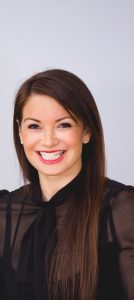 flee, but because she followed this movement of people from Belize coming to the united states. Carla described this movement as a chain, where one person from Belize came to the US, sent word back, and then more people followed. Although her mother ended up staying in the United States, that was never her intention. Among many of the Belize migrants, Carla’s mother was, with the intent to work hard to make a lot of money and go back to Belize and start a life for themselves. But as time went on, it became harder and harder to think of returning as they got acclimated to life in the United States. Even though they were working menial jobs, and were always a little nervous, they fell in love with the American way of life.
flee, but because she followed this movement of people from Belize coming to the united states. Carla described this movement as a chain, where one person from Belize came to the US, sent word back, and then more people followed. Although her mother ended up staying in the United States, that was never her intention. Among many of the Belize migrants, Carla’s mother was, with the intent to work hard to make a lot of money and go back to Belize and start a life for themselves. But as time went on, it became harder and harder to think of returning as they got acclimated to life in the United States. Even though they were working menial jobs, and were always a little nervous, they fell in love with the American way of life.
After a year and a half of working, her mother had saved enough money to pay for someone to help Carla, her aunt, uncle, and four cousins make the trek from Belize to the United States. When they finally made it to the US border, they were caught. Her aunt and uncle were arrested, and Carla and her cousins were taken into foster care. She said she had a very different experience at the border than she sees in the news, as she recalls the kind treatment of the officer. Reassuring Carla and her cousins that it was all going to get sorted out, and they would find nice families for them to stay with in the meantime.
Although it wasn’t necessarily the best experience because she was scared and missed her 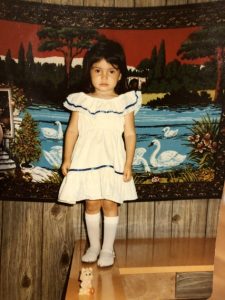 aunt and uncle, she was with her youngest cousin and the family was very nice to her and she even had two of what were technically “foster sisters” who were around the same age. She says this is very different from what she sees in the news nowadays, but she also questions what is really real because a lot of Television now is just propaganda. The tide has really turned for how we treat immigrants, there is a wave of nationalism. There aren’t any fosters and sister and brother and kind officers, but cages and poor conditions and kids who come in without parents arent treated the same way she was. Carla recalls when she was younger, she never really felt unwelcome, but worldwide, there is really this anti-immigrant sentiment, not even just in first world countries. While she was with her foster family for a couple of months, her family had collectively raised enough money and actually paid off the border security to release her and her cousins.
aunt and uncle, she was with her youngest cousin and the family was very nice to her and she even had two of what were technically “foster sisters” who were around the same age. She says this is very different from what she sees in the news nowadays, but she also questions what is really real because a lot of Television now is just propaganda. The tide has really turned for how we treat immigrants, there is a wave of nationalism. There aren’t any fosters and sister and brother and kind officers, but cages and poor conditions and kids who come in without parents arent treated the same way she was. Carla recalls when she was younger, she never really felt unwelcome, but worldwide, there is really this anti-immigrant sentiment, not even just in first world countries. While she was with her foster family for a couple of months, her family had collectively raised enough money and actually paid off the border security to release her and her cousins.
After being picked up from the foster care, she hadn’t been with her mother for around two years, so when her she came to pick her up, Carla was really scared and wanted her aunt 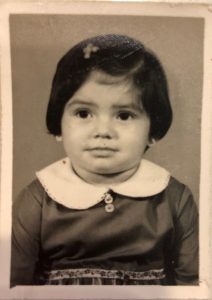 because her mother was like a stranger to her. She remembers feeling scared and lonely and felt out of place, not because of the physical place she in but because she didn’t recognize the person she was with. From here on, she and her family lived in a suburb in Illinois with a whole community of Belizeans. Even though she was released from the foster care because the guards were paid off and didn’t go through any legal channels, she still technically wasn’t a US citizen.
because her mother was like a stranger to her. She remembers feeling scared and lonely and felt out of place, not because of the physical place she in but because she didn’t recognize the person she was with. From here on, she and her family lived in a suburb in Illinois with a whole community of Belizeans. Even though she was released from the foster care because the guards were paid off and didn’t go through any legal channels, she still technically wasn’t a US citizen.
She was in third grade at the time, and although they were relatively well integrated into the community, there was still a big difference to her, before and after being naturalized. 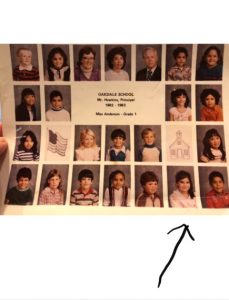 She remembers explicitly that she and her cousins were told they could never tell anyone that they weren’t born in the united states. There was always this fear in the back of her head, a cloud of uncertainty, they could never plan 6 months ahead because they never knew what was going to happen.
She remembers explicitly that she and her cousins were told they could never tell anyone that they weren’t born in the united states. There was always this fear in the back of her head, a cloud of uncertainty, they could never plan 6 months ahead because they never knew what was going to happen.
Other Belizeans in her community received amnesty through Ronald Regan, and she became a citizen shortly before because her mother’s husband, her stepfather, adopted her. There was this sigh of relief like a big weight had been lifted off of her shoulders. She could even see the impact that it had on members in her community, 20-year-olds who were working went back to school. It opened a lot of doors because they really were in the shadows of society at that time.
After Carla and her family became citizens, they could finally travel outside of the United States, although they didn’t go very often. Because her mother moved when she was so young, both of her parents had passed away, and a couple of her brothers and sisters were already in the US; there wasn’t really much for her mother to go back for. Just a couple of weeks ago, Carla’s mom approached her and said that she wanted to go back to Belize after 15 years when she got word that her sister was sick. Her mom was able to connect with some old family and friends through facebook and is actually really looking forward to going, which is something different.
In the future, she really wants to take her children and her husband back to Belize and show them where she is from. When reflecting on her past, she feels like she has lived 10 different lives. Growing up in a tiny town that sometimes didn’t even have electricity, and then living the American Dream, going to college and then dental school, living in a nice 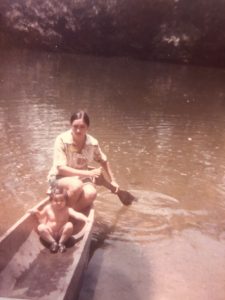 house, and having a husband who is a doctor. Going from one extreme to the other really shapes how she views the world, and thats something she will never forget.
house, and having a husband who is a doctor. Going from one extreme to the other really shapes how she views the world, and thats something she will never forget.
When discussing her parenting ideals, she says that she and her husband always talk about how their kids will bever know what it’s like to be hungry, or cross the Rio Grande river in the middle of the night, or be afraid you will be arrested. Not that she wants her children to experience those things but that she wants them to be hard-working, and appreciate what they have. She wants her children to understand that not everybody outside the United States lives the way they do, and she wants them to become good citizens and help people like Carla when she was three years old. Her parenting philosophy is that education will come, but what’s important is that she teaches her children to be empathetic and hard working.
For Carla, it’s important to distinguish between the different reasons people migrate. When her mom came in the 80s, she came for economic reasons, because there was no opportunity for them back in Belize. She says thats different from the people who are coming now, these people are running away from violence, running for their lives because they literally aren’t able to live. She wishes that policymakers knew that these people aren’t trying to exploit the system. If they have the opportunity, they will go to school, become members of society, and help the economy. If they could live in their home country peacefully, they would, but they can’t do that. If policymakers could look at each person’s story and experiences individually, she thinks it could help change their minds.
Personal Reflection
I didn’t know much about Carla before our interview. I knew the little bits that I learned from my pre-interview and what my Dad told me through knowing her husband, but that was it. Throughout my experience interviewing Carla, I kept thinking about how scary all of this is for anyone, let alone a child.
Because this experience happened to Carla when she was young, I was able to get an interesting perspective of talking to her about her experiences as a child with the ability to articulate it as an adult. One part about Carla’s story that really impacted me the most was how she and her cousins were instructed by their families not to tell anyone they were born outside of the United States. I feel the fear and burden that comes along with being told you have to keep this part of your life a secret or else you may be deported is much beyond the scope of what any child should have to comprehend. Although this is a seemingly small aspect of Carla’s story, this had a significant impact on me because that is such as large weight to have on someone’s shoulders, especially a child, and it put things into perspective for me. Something that she thought about every day was something I never had to think about.
Another fact about Carla’s story that affected me was learning about her experience at the United States border. When Carla and her family were caught at the border, the officer that stopped them was very nice, and she and her cousins, and they actually went into the foster care system. When I heard this, I was surprised and confused because that is extremely different from the current information I see on the news. I didn’t know that the United States had a program like this. When I learned that they were able to pay off the guards, I kept thinking about how there is no way that could happen now. This really impacted me because this is a total 180 from what I see on the news and It’s baffling to see how quickly policy can change from protecting children in foster care systems to the current conditions in border detention facilities
Another significant fact I learned about Carla is how much her experiences shaped how she viewed the world and how she raises her children. Because of her experiences, her parenting philosophy is not centered strictly around education, because that can come, but it’s about teaching her children to be empathetic, happy people. She wants her children to have an understanding of how other people live in other countries and wants them to help people and know the value or hardworking and help people like their mom when she was little. Before I heard this, I never thought about what that might be like to have a completely different childhood than the one your own children have. Wanting to teach them the values that you learned through a very difficult period in your life, that made you who you are, while not wanting them to go through those experiences.
Overall my experiences with Carla really helped open my eyes to the perspective of a child who experiences migration. I really appreciated learning about the little parts of life that are impacted by not having citizenship or having migrated that I would never have expected, such as not being able to tell your peers that you weren’t born in the United States. I feel like many of the stories I have heard from the perspective of older adults, and because Carla was so young when she migrated, it was a very different experience talking to her. I learned that the migration experience from the perspective of a child is very different than an adult because, in a lot of ways, you don’t understand what is happening in the way that an adult does, yet you also can adapt easier to your surroundings.
